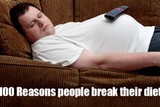 No matter who you are, dieting is an invariably difficult process. Even the most dedicated, strong-willed person can fall into one of many pitfalls that plague dieters across the entire world. You should take note of the reasons why you might encounter trouble in sustaining your diet; by being aware of these dangers, you can help to preserve your determination and eventually achieve your goal of losing weight.
No matter who you are, dieting is an invariably difficult process. Even the most dedicated, strong-willed person can fall into one of many pitfalls that plague dieters across the entire world. You should take note of the reasons why you might encounter trouble in sustaining your diet; by being aware of these dangers, you can help to preserve your determination and eventually achieve your goal of losing weight.
(Posted originally at NonDiet.com – see it here in full)
A Healthy Balance
The trick to successful dieting is to adopt healthy eating habits that you will be able to uphold for many years to come. If your diet is too extreme, you will find it impossible to maintain your new lifestyle for more than a few weeks. Furthermore, intense dieting can have numerous health detriments, oftentimes causing far more problems than it solves.
- You do not provide your body with enough calories to get through the day.
- You eliminate key nutrients from your diet.
- You try to lose too much weight too quickly.
- You become exhausted from undernourishment and excessive exercise.
- Your restricted calorie intake causes you to constantly crave food.
- You become physically ill due to insufficient nutrition.
Motivation
One of the most difficult aspects of the dieting process is staying motivated. It is impossible to lose weight without being completely dedicated to the task at hand.
- You give up on your goals when you encounter pain or difficulty.
- You do not regard weight loss as your greatest priority.
- You diet for the wrong reasons (physical appearance rather than health).
- You begin to think that your efforts will never secure the results you desire.
- You allow the challenges of losing weight to overcome your personal desires.
Setting Goals
Most dieters will find their greatest success if they have tangible goals to work towards. By setting challenging yet achievable goals, you can propel your weight loss journey to new heights.
- You do not push yourself to meet the goals you have set.
- Your goals are too vague.
- You are lenient with yourself in meeting deadlines.
- The goals you set are too easy and do not indicate major accomplishments.
- You set unrealistic goals and become depressed when you cannot reach them.
- You change your goals in accordance with your progress.
- You do not congratulate yourself upon meeting smaller goals.
- Once you have achieved your initial goals, you do not push yourself to meet more.
Support Systems
Friends and family are invaluable in helping you to stick to your diet. Without steady support from the people who care about you, you will find it immensely difficult to maintain your new lifestyle.
- You do not ask friends and family for support.
- Your friends and family encourage you to ‘treat yourself’ too often.
- Your friends and family are not understanding of the difficulties you face.
- You do not allow others to help you achieve your goals.
- The people around you indulge themselves in unhealthy eating habits of which you cannot take part.
- Your friends and family do not recognize the achievements that you have made.
Genetics
Some people are genetically predisposed to gain weight more easily than others. Although you cannot overcome the dieting challenges that are imposed by genetics, your awareness of these factors can help to prevent depression in the face of weight loss obstacles.
- Your metabolism is relatively slow.
- You are inclined to crave unhealthy foods.
- You find exercise difficult.
- You do not have a very strong will.
- Your hormones cause you to consume more food than your body requires.
Reading Labels
Many people are unaware of what nutritional labels actually mean. Misinterpretation of the information that is printed on these labels can have disastrous dieting effects.
- You do not read nutritional labels.
- You only study total fat content rather than the types of fats that a food contains.
- You do not check the amount of fiber in grain-based products.
- You consume ‘red flag’ ingredients such as hydrogenated oils.
- You consume too much sodium.
- You do not check the designated serving sizes.
- You eat foods that are high in sugars and other refined carbohydrates.
- You become obsessed with calorie-counting.
Your Environment
Your environment can have a profound effect on your weight loss success. The pressures that you face every day will vary depending on where you live, work, and entertain yourself.
- Your home is full of unhealthy foods.
- You do not have access to a gym or to another exercise area.
- Your work place contains vending machines, open refrigerators, or other areas with unhealthy foods.
- The people who live around you participate in unhealthy eating habits.
- You work in an environment where you must sit behind a desk all day.
- You frequent places where unhealthy foods are readily available, such as movie theaters or amusement parks.
- You live in an area where it is difficult to obtain fresh foods.
- You dine out frequently.
Special Occasions
There is no reason why you cannot reward yourself with a small treat at Christmas or on your birthday. However, many people tend to allow their diets to go right out the window whenever a special occasion comes around. You should be wary of the following holiday pitfalls.
- You do not practice moderation.
- You consume foods that are excessively high in fat or sugar.
- You rationalize that one day off of your diet will not harm you.
- You become tempted by the actions of the people around you.
- You lose sight of your weight loss goals in the midst of other festivities.
Unawareness
Many people are simply unaware that many of the foods they consume can lead to weight gain. In order to be successful on your diet, you must be very knowledgeable about all of the foods that you eat.
- You are unaware of what a proper serving size is.
- You do not know the difference between various types of fats.
- You do not understand the dangers of eating refined carbohydrates.
- You are not informed of the diseases that weight gain can entail.
- You believe that foods are lower in calories than they actually are.
- You do not track the amount of food that you consume in a given day.
Blood Sugar Levels
Humans crave food when their blood sugar levels are low. By allowing your blood sugar level to drop too low and then spike with sudden food consumption, you can prevent yourself from losing weight.
- You allow your blood sugar to drop too low and then overcompensate with an enormous meal.
- You provoke your body’s insulin system to store excess fat by causing blood sugar spikes.
- You ignore the signals that your body gives you based on your blood sugar levels.
- You consume refined rather than complex carbohydrates, leading to blood sugar spikes.
- You skip meals, causing your blood sugar levels to drop dangerously.
Stress
Stress can undermine even the most dedicated dieter’s weight loss efforts. When your attention is consumed by stressful factors in your life, your dieting plans oftentimes fall by the wayside.
- You overeat or you eat unhealthy foods as a source of comfort.
- You feel too stressed to take the time to prepare healthy meals.
- You forget about your weight loss goals in the face of stressful events.
- You neglect your exercise routine to free up time to take care of stressful matters.
- Hormonal imbalances induced by stress cause your body to store excess fat.
Insufficient Exercise
It is nearly impossible to lose a significant amount of weight without sticking to a regular exercise plan. By staying dedicated to your workout routine, you can greatly improve your chances of achieving your goals.
- You feel too tired to exercise on a regular basis.
- Your workout routine is not intense enough.
- Personal injuries prevent you from exercising adequately.
- You are not motivated to overcome difficult workouts.
- You do not have exercise equipment available to you.
- You do not have the time to exercise regularly.
- You find exercise to be boring and uninspiring.
Past Experiences
The more you struggle with your weight, the more difficult it can be to get under control. Past experiences are key in determining your weight loss success.
- You were teased for your weight as a child.
- You suffered from eating disorders.
- You failed at many diets in the past.
- You once lost a significant amount of weight, only to gain it back.
- You used to find weight loss easy and are now faced with a sudden metabolic change.
- You once experienced a traumatic event, and you now use food as a source of comfort.
Personalizing Your Diet Plan
No single diet is right for everyone. In order to lose weight, you must personalize your diet plan to suit your own needs.
- You follow popular fad diets that do not take your personal conditions into account.
- You strictly adhere to general dietary recommendations.
- You do not adjust caloric needs in accordance with your body weight.
- You precisely imitate the eating habits of a friend or coworker.
- You strive to reach an extremely specific weight.
- You ignore your body’s personal warning signs.
- You overeat because other people are able to eat more than you can without gaining weight.
Reasons for Losing Weight
If your reasons for losing weight are not healthy, you will not be able to maintain your new healthy lifestyle. People who diet purely for image purposes will encounter great difficulty in losing weight.
- You diet only to reach a specific clothing size.
- You diet only because you are unsatisfied with your appearance.
- You diet because others are pressuring you to do so.
- You do not care about weight loss’s health and longevity benefits.
- You diet only to reach a certain weight and are satisfied as soon as you have hit that goal.
- You do not wish to maintain a healthy lifestyle for an extended period of time.
- You suffer from personal image disorders.
Boredom
Many people give up on their diets simply because they are tired of dealing with eating restrictions. Boredom is a surprisingly potent adversary to weight loss goals.
- You envy others who are not on a diet.
- You crave foods that you used to eat.
- You want to revert to your ‘normal’ habits.
- You feel limited in your diet’s food choices.
- You are impatient with your diet’s slow progress.
- You find exercise to be boring and overly time-consuming.


